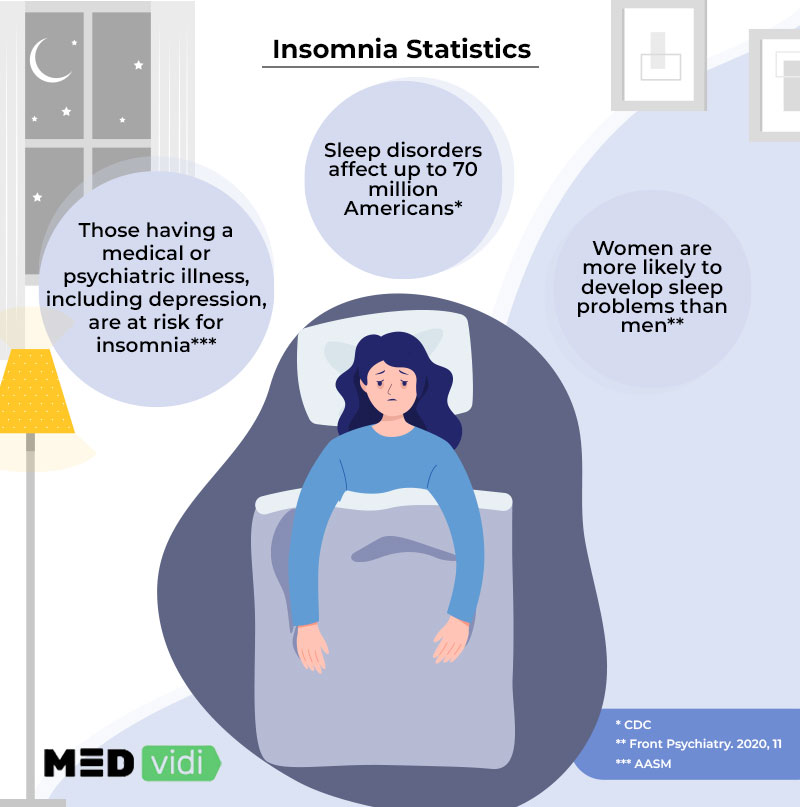Insomnia is a sleep disorder in which a person finds it difficult to fall asleep, stay asleep, or get a restful night’s sleep. One might be getting up too early, yet it becomes impossible to fall asleep again. Mostly, they feel tired upon waking up, regardless of the hours spent sleeping.
Not only does insomnia drain one’s energy and destabilize mood, but it also disrupts the overall well-being and work performance. To prevent the development of severe insomnia and its impact on mental and physical health, learn more about this condition and what can be done to manage it.
Start insomnia treatment today to prevent serious consequences of sleep deprivation.
Types of Insomnia
Sleep disturbance can be a short-lived issue that comes and goes or a longstanding problem without remission. Thus, depending on symptom duration, insomnia is classified as either acute or chronic.
Sometimes, people experience acute insomnia, also known as short-term sleep deprivation. It lasts days to weeks following traumatic events or other stressors. On the other hand, chronic insomnia is diagnosed when the symptoms are noticed at least three times a week and last three months or more. It occurs as a primary condition but can be precipitated by chronic illnesses or prolonged medication use.
Whether acute or long-term, insomnia makes one endure sleepless nights characterized by tossing, turning, and having multiple awakenings. All this can be problematic to your health and predisposes you to conditions like obesity, hypertension, and diabetes.
What Are the Symptoms of Insomnia?
Insomnia symptoms can vary from person to person, but the disorder is primarily characterized by:
- Difficulty falling asleep
- Waking earlier than intended
- Waking multiple times during the night
Chronic insomnia is likely to trigger other symptoms such as:
- Feeling tired and grumpy on waking up
- Sleepiness during the day
- Increased errors at work and risk of accidents
- Problem paying attention and focusing
- Increased forgetfulness
- Anxiety, depressed mood, and irritability
- Constant worries about sleep
How Common Is Insomnia?
Generally, sleep disorder cases are quite common, affecting up to
Once the symptoms of insomnia start affecting your daily functioning or you simply find your symptoms disturbing, it’s time to see a specialist.
When Should You See the Doctor
Insomnia makes it difficult to function properly during the day. When you detect you’re making more errors than usual or note a decline in performance because of lack of sleep, seek professional assistance. This will help you identify the root cause of your problem and institute a treatment plan. Your doctor might refer you to a sleep center for further testing after evaluating the possible signs of insomnia.

What Causes Insomnia?
Although insomnia can be the primary issue, most cases are associated with underlying medical, psychiatric, or other conditions. The causes of insomnia may also include stressful life events. For example, a sudden loss of a loved one can trigger longstanding insomnia. When insomnia is secondary, treatment of the underlying condition might be enough to cure the sleep disorder.
Common reasons for insomnia cases involve:
- Stress. Stress is considered as one of the major causes of insomnia. Worries about everyday activities such as work, school, family, health, or finances can make it difficult to sleep as they keep your mind active even at night. More severe events like job loss or divorce can be more devastating, leading to profound insomnia.
- Poor sleep habits. Certain practices, including using phones and computers in bed, irregular bedtime schedules, uncomfortable sleep environments, and engaging in stimulating activities before bed, can disrupt your sleep cycle and precipitate insomnia. Eating or watching TV from the bed can also lead to sleep disturbances.
- Daily schedule. Circadian rhythm is the internal clock that regulates sleep-wake cycles.
Disruption[3] of this internal clock by working late into the night, waking up early, or frequently changing work shifts may result in insomnia. Jet lag due to traveling across different time zones can also interfere with the circadian rhythm. - Heavy eating before bed. It can make you physically uncomfortable and cause sleep deprivation. When you are too full, you will likely experience heartburn that can keep you awake for hours.
Get prescription for insomnia online and have the restful sleep you deserve.
Health Conditions and Other Factors Causing Insomnia
Some chronic illnesses and the use of particular medications can precipitate insomnia. That said, the sleep disorder might persist even after treating the underlying health problem. Conditions and drugs that commonly cause insomnia include:
- Psychiatric disorders. Depression, anxiety, bipolar disorder, post-traumatic stress disorder, and psychotic disorders often disrupt the sleep cycle, leading to insomnia. People with
mania[4] often have a decreased need for sleep with potentially harmful exhaustion. Insomnia disorder often has abidirectional[5] relationship with psychological disturbances, implying mental health disease can cause insomnia and vice versa. - Chronic medical conditions. Individuals diagnosed with terminal illnesses such as cancer or other chronic diseases like Alzheimer’s, Parkinsonism, hypertension, chronic pain syndrome, and asthma are more prone to poor sleep.
- Medications. Some prescription and over-the-counter medications can potentially disrupt your sleep cycle, leading to insomnia. These drugs include certain antidepressants, antihypertensives, and allergy medications.
- Stimulants. From caffeine and nicotine to alcohol, stimulants interfere with sleep, especially when consumed before bed.
Caffeinated[6] drinks like cola and beverages (tea and coffee) are rich in these stimulants, and drinking them late in the evening can make it difficult for you to fall asleep at night. Also, alcohol interferes with deeper sleep stages and causes multiple awakenings in the night. - Sleep-related disorders such as restless leg syndrome and sleep apnea also interfere with your night rest. With restless leg syndrome, you experience unpleasant sensations accompanied by an irresistible desire to move your lower limbs when in bed, preventing you from falling asleep. On the other hand, sleep apnea, whether obstructive or central, causes you to periodically stop breathing when asleep, forcing you to awake gasping for air. This can occur multiple times and disrupt your sleep.
Sleep Changes With Age
As the years advance, the body’s clock changes leading to alterations in sleep patterns. Usually, people get tired and fall asleep earlier but also wake up earlier than desired. With
- Decreased activity. The elderly are usually less active, socially and physically, and tend to nap several times a day. This can disrupt night sleep.
- Health deterioration. Geriatric conditions like arthritis, back problems, and psychiatric disorders often affect sleep. Bladder or prostate problems that occur with age can force you to wake several times at night to urinate.
- Multiple medications. The elderly are prone to diseases and are often on many prescribed medicines, which can cause insomnia.
Insomnia Risk Factors
Occasional sleeplessness is a common occurrence for many people. But the following can put you at a greater risk of developing long-standing insomnia:
- Gender. Women are
more likely[8] to develop sleep problems than men. Causes of insomnia in females mainly stem from the hormonal fluctuations that occur during menstruation, pregnancy, and menopause. - Age. Those over
60 years[9] often suffer from insomnia because of the changes in their activity and health. - Health disorder. Individuals with underlying mental or medical health conditions are at a higher risk of developing insomnia and other sleep disorders.
- Major stressors. Stressful events like the death of a loved one and divorce can trigger sleep disturbances.
- Irregular schedule. Frequently changing work shifts or traveling across several time zones disrupts the sleep-wake cycle.
What Risks Are Increased by Insomnia
Sleep is essential for optimal functional and overall health. Thus, patients having insomnia usually report lower quality of life. Other complications include:
- Greater risk and severity of chronic diseases like hypertension, diabetes, and
heart failure[10] . - Poor performance at work and school due to decreased concentration.
- Increased risk of errors and accidents.
- The development of mental disorders like depression and anxiety.
Prevention of Insomnia
Proper sleep hygiene can improve sleep and prevent insomnia. These include:
- Keeping consistent bed and wake times even during weekends.
- Staying active during the day.
- Checking if prescription and over-the-counter medications lead to insomnia and telling the doctor about your concerns to choose the most fitting medication.
- Avoiding caffeinated drinks and beverages late in the evening.
- Avoiding naps.
- Taking light meals before bed.
- Creating a comfortable sleep environment.
Take Control of Insomnia
Ever asked yourself, “why can’t I sleep at night?” If it’s a repetitive question, it is a good decision to see a doctor and check if you have insomnia.
Insomnia is more than a small inconvenience. Insomnia side effects can disrupt your mental and emotional well-being as well as adversely impact your physical health. Be sure to seek the help of a health practitioner whenever you have issues with your sleep cycle. With professional help, you can adopt behavioral and lifestyle changes in addition to therapy and medications that improve the quality of your sleep and grant you restful nights. Connect with MEDvidi to find the best insomnia treatment plan for your needs.










